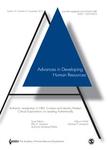版权所有:内蒙古大学图书馆 技术提供:维普资讯• 智图
内蒙古自治区呼和浩特市赛罕区大学西街235号 邮编: 010021

作者机构:Texas A&M Univ Educ Adm & Human Resource Dev 542 Harrington Tower College Stn TX 77843 USA Texas A&M Univ Higher Educ Adm Program College Stn TX USA Texas A&M Univ Coll Educ & Human Dev Fac Affairs College Stn TX USA
出 版 物:《ADVANCES IN DEVELOPING HUMAN RESOURCES》 (人力资源开发进展)
年 卷 期:2018年第20卷第4期
页 面:498-516页
学科分类:12[管理学] 120202[管理学-企业管理(含:财务管理、市场营销、人力资源管理)] 1202[管理学-工商管理]
主 题:talent development learning talent management learning and development human capital development capacity building talent development learning talent management learning and development human capital development capacity building
摘 要:The Problem It has been argued correctly that of all the resources that nations are endowed with including physical resources such as land, gas, oil, mineral resources, and financial resources, the most durable resource is people. It is also a truism that regions endowed with large populations such as Brazil, China, and India are now emerging nations with very strong and growing economies. As the world of work changes globally, the demand for talent development is becoming one of the greatest opportunities for profit and nonprofit organizations in emerging economies such as Kenya. Africa with its young and educated population and its competition for talent poses both opportunities and challenges as the continent tries to address this critical component. Nowhere is this opportunity for talent development (TD) more urgent than in Kenya. The Solution Given the rising of Africa s youth population and the need to develop talent in this region of the world, there is no easy or ready-made solution to guide human resource development (HRD) researchers and practitioners and policy makers in developing and optimally utilizing Africa s best resource-its people. However, this article seeks to demonstrate how strategic planning and provision of quality education are the best form of intervention for TD in Africa. The fact that individuals have talent is not sufficient, hence the importance of developing talent through learning. Thus, learning requires well-designed quality education and training programs that can lead to people being open to new ideas and a disposition to question what people already know. This is even more seminal especially in the fast-changing technology-controlled workplace. The Stakeholders Human resource officers, learning and development officers, Directors of Human Resource Management, HRD researchers, HRD practitioners.